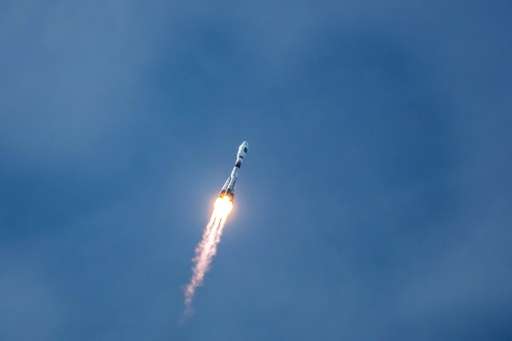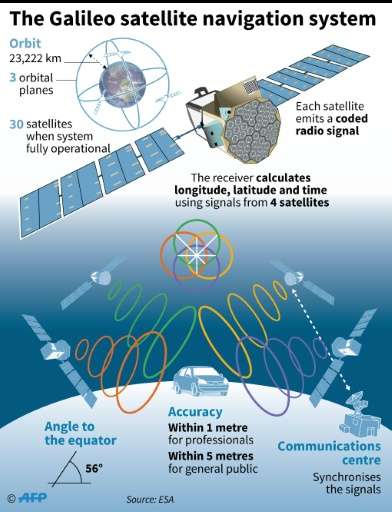Europe grows Galileo sat-nav system

Europe's Galileo sat-nav system, a rival to America's GPS, should move closer to operation with the launch Tuesday of a fresh pair of satellites to join a dozen already in space.
Orbiters 13 and 14 are scheduled to blast off on a Russian Soyuz rocket from Europe's spaceport in Kourou, French Guiana, at 0848 GMT.
After a journey of nearly four hours, they should enter Earth orbit at an altitude of 23,522 kilometres (14,615 miles).
Ultimately, the multi-billion-euro constellation is meant to comprise 24 operational satellites, providing navigation as well as search-and-rescue services.
Another launch, this time of four orbiters on a single rocket, is expected to boost the constellation to 18 by year-end, allowing for Galileo to start providing usable signals.
"Thereafter, the system's precision will improve with every new satellite placed in orbit," said Jean-Yves Le Gall, head of France's CNES space agency.
More modern than GPS, Galileo's high-tech instruments should allow it to provide a more precise signal.
"With GPS, we can see where a train is on a map of France, with Galileo we will know on which track it is," said Le Gall.
But the project has been plagued by delays, technical glitches and budgetary difficulties.

The launch of the seventh and eighth orbiters in March last year was about three months late to allow engineers time to probe an August 2014 mishap which sent satellites five and six into a lopsided orbit.
The incident was blamed on frozen fuel pipes on the Soyuz rocket's fourth stage, called Fregat—a problem the European Space Agency says has since been fixed.
The launch of satellites five and six—meant to have been the first fully operational Galileo orbiters—had itself been delayed by more than a year due to "technical difficulties".
The first four orbiters were hoisted in 2011 and 2012.
Tuesday's launch, the seventh for Galileo, was a late addition to the schedule, in a bid to speed up deployment of the project funded by the European Commission, the European Union's executive body.
It had budgeted some seven billion euros ($7.8 billion) for Galileo until 2020.
The remaining satellites will be launched using a combination of Russian Soyuz rockets, which can take two into space at a time, and Europe's own Ariane 5 ES launcher, specially adapted to handle four.
© 2016 AFP




















